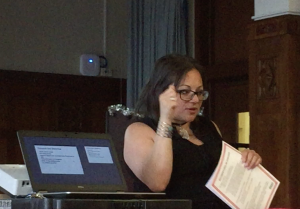Cook County immigrant parents seek help for undocumented teens
By Jean Lotus Staff reporter — May 31, 2016
Immigration attorney Mony Ruiz-Velasco tells parents not to let their children open the door for immigration agents at a session for undocumented parents at Proviso East High School May 26 (Chronicle Media Photo)
As the federal government announced national plans for a month-long series of deportation raids starting in May and June, immigrants in Cook County without legal immigration status are seeking information about their rights and looking for programs to help them.
On May 26, Proviso Township High School District 209 began a series of five information sessions about the federal Deferred Action for Childhood Arrival (DACA) program. The event, held at Proviso East High School, 807 S. First Ave. in Maywood, gave parents information about the 2012 federal executive order, which allows persons brought into the United States as children a renewable two-year opportunity to work. Presenters from Melrose Park-based P.A.S.O. (Proyecto de Acción de los Suburbios del Oeste/West Suburban Action Project) also gave parents information about the announced raids, as well as a summary of their rights if detained in a raid.
Immigration lawyer Mony Ruiz-Velasco said many undocumented students over the past few years placed their college hopes on proposed DREAMer legislation, which would have given them a chance at federal college financial aid. The proposed DREAMer laws were never passed leading to the DACA executive order.
Parents at the presentation agreed their students were frustrated.
“My child asked me, ‘Why can’t you just buy papers for me, mom?’” a mother said in Spanish. “I answered, ‘It’s not so simple.’”
Ruiz-Velasco explained how students at Proviso could determine if they were eligible for the DACA program. The discretionary program allows young people under age 30 to apply for a temporary two-year “deferred action” status. This means that they are “put lower down on the deportation list and are allowed to work for two years,” Ruiz-Velasco said. They are also issued a Social Security number, which allows them to leave the country and re-enter.
To apply for DACA, young people must prove they were in the country in 2007, usually through school records, Ruiz-Velasco said. She said evidence must be presented that candidates had attended high school in the U.S., attained a GED or served in the U.S. military. Applicants must also have been in the country in 2012 when the executive order was passed. Courtroom evidence must be obtained of the disposition of any criminal charges for felonies and even misdemeanors. The fee is $465.
If accepted for DACA, the student has permission to work or attend college in the U.S. for two years, which can then be renewed.
What to do in a deportation raid
Ruiz-Velasco also told parents about raids announced by the U.S. Department of Homeland Security Immigration and Customs Enforcement (ICE) agency. A planned 30-day raid period in May-June was leaked to Reuters and other news agencies in mid-May. The plan will target Central American women and children fleeing violence who were captured entering the U.S. illegally last year and then did not return for their court dates, according to Reuters.
A similar series of raids in January this year detained more than 150 families in California, Maryland, Georgia, North Carolina and Texas. Immigration advocates complained the raids were harsh and hurt women and unaccompanied children.
Homeland Security Secretary Jeh C. Johnson said the January raids were necessary to enforce the laws of the United States.
“I know there are many who loudly condemn our enforcement efforts as far too harsh, while there will be others who say these actions don’t go far enough,” Johnson said in a January 2016 statement. “I also recognize the reality of the pain that deportations do in fact cause. But, we must enforce the law consistent with our priorities. At all times, we endeavor to do this consistent with American values, and basic principles of decency, fairness, and humanity.”
Ruiz-Velasco works with immigrants who have been detained by ICE officers. At the meeting, she advised parents to teach children to “never open the door” since ICE agents operate without a warrant and will enter if a door is opened. She also noted that ICE agents often drove unmarked vehicles and often did not wear uniforms. Ruiz-Velazco also advised parents to keep important documents in a safe place and to memorize a telephone number of a trusted friend, relative, or a lawyer.
She urged parents to plan ahead with children. If detained, Ruiz-Velasco told parents to give only a name and date of birth. This information is entered into an inmate database and allows family members to find a detainee.
Ramiro Gonzales, former Cicero town president, who works with the Mexican Consulate, shared a 24-hour help line for Mexican nationals caught in a deportation raid.
Demographically, District 209 now has an almost equal number of African-American (49 percent) and Latino (46 percent) students, with 3 percent white and 1 percent Asian, according to the Illinois Report Card. The changes reflect demographic shifts in the 10 towns in Proviso Township, which feed into the district: Bellwood, Berkeley, Broadview, Forest Park, Hillside, Maywood, Melrose Park, North Lake, Stone Park and Westchester.
The district just hired its first Latino superintendent, former Milwaukee Public Schools Regional Superintendent Dr. Jesse Rodriguez, who will start in July.
More DACA information sessions are planned for this summer at Proviso West High School in Hillside and Proviso Math and Science Academy in Forest Park.
Read the current issue of the Cook County Chronicle
Free digital subscription to the Cook County Chronicle
— Cook County immigrant parents seek help for undocumented teens —







